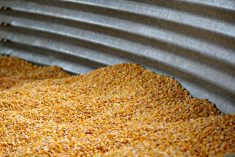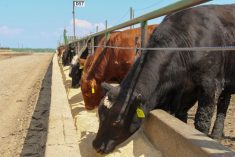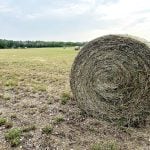CNS Canada — A better-quality Canadian grain crop in 2017 has opened the door to increased imports of distillers dried grains with solubles (DDGS) from the U.S., as Canadian livestock feeders look for other options.
Canada imported about 700,000 tonnes of the ethanol byproduct from the U.S. in 2017, the largest imports since 2011 and well above the previous five-year average of roughly 500,000 tonnes, according to Statistics Canada data.
Early numbers for 2018 show a continuation of that trend, with 62,000 tonnes of DDGS shipped from the U.S. to Canada in January, according to U.S. trade data.
Read Also

U.S. livestock: Feeder cattle hit contract highs on tight supply
Chicago | Reuters – All Chicago Mercantile Exchange feeder cattle futures and most live cattle futures hit contract highs on…
“We’re bringing a lot more up (to Canada) this year just because of the improved quality (Canada) had with its wheat and barley,” said Sean Broderick, DDGS marketing manager with CHS Inc. in Minnesota, noting there were smaller domestic supplies of feed wheat and barley in Canada this year.
The profitability of feeding cattle and hogs in Canada also looks good, he said.
Canada accounted for six per cent of all U.S. DDGS exports in 2017, which compares with four per cent the previous two years, said Broderick.
Mexico is the largest single customer for U.S. DDGS, with Asia also presenting opportunities. Broderick said the sabre-rattling going on out of the White House towards the global trade arena lately does raise some concerns for the DDGS export sector, as protectionist trade policies likely reduce some interest in sourcing from the U.S.
From a pricing standpoint, DDGS are looking attractively priced compared to soymeal, but are trading above corn, he said.
Ethanol facilities typically take some downtime at this time of year ahead of the summer driving season and an increase in demand, which could mean a seasonal slowdown in DDGS supplies over the next few weeks.
— Phil Franz-Warkentin writes for Commodity News Service Canada, a Glacier FarmMedia company specializing in grain and commodity market reporting.

















